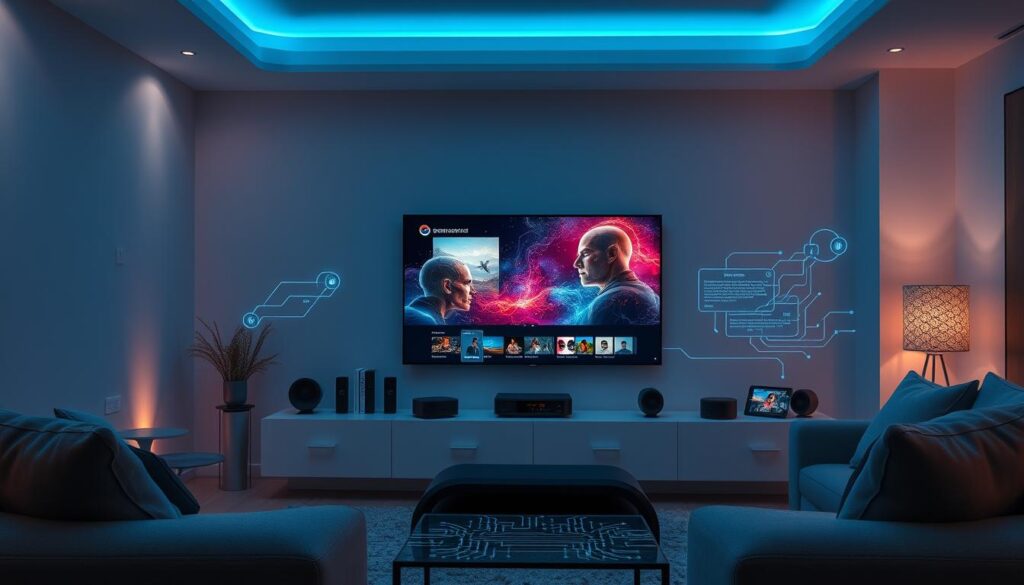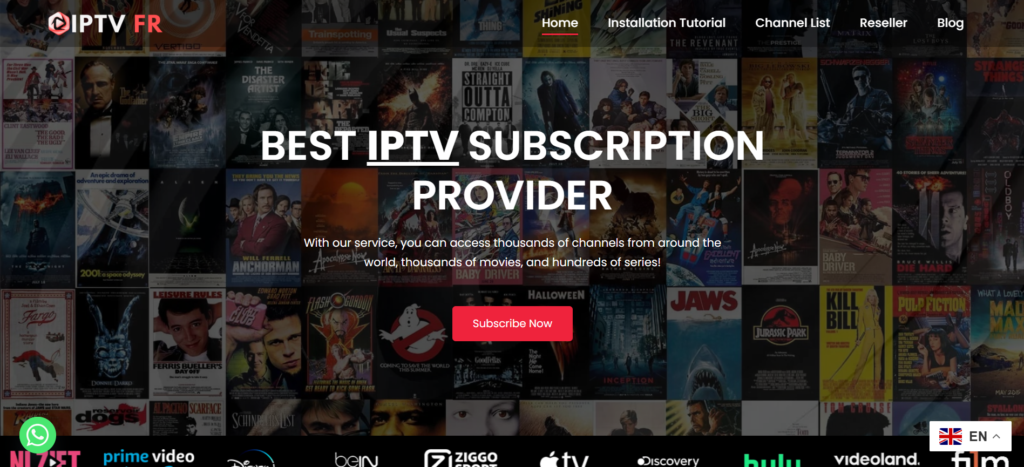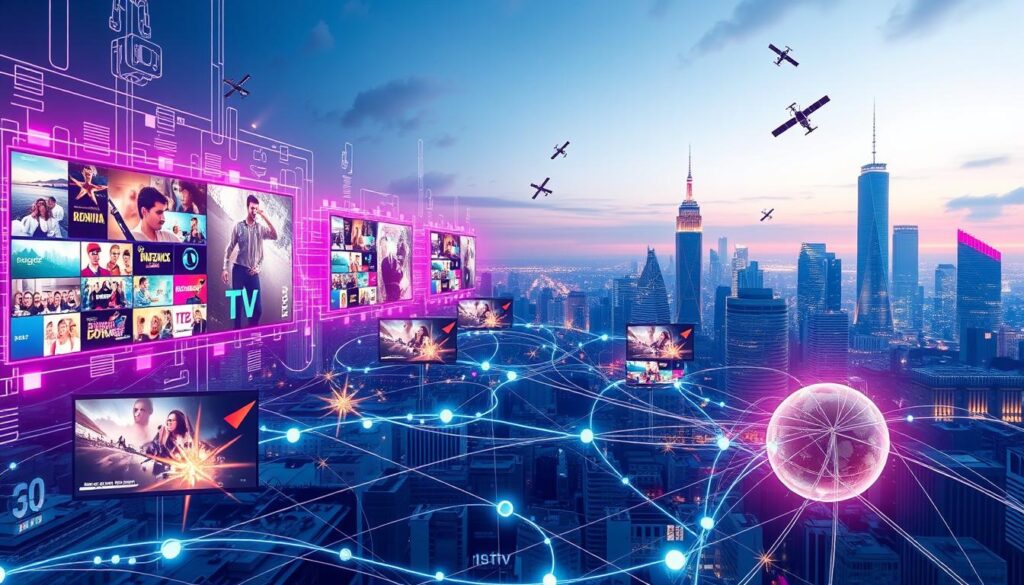In today’s fast-changing digital world, how we watch TV has changed a lot. We no longer need to stick to cable or satellite TV. Now, Internet Protocol Television (IPTV) brings us a new way to enjoy TV.
I’ve seen how IPTV has changed TV watching. It lets us watch our favorite shows and movies in new ways. With fast internet, you can pick what you want to watch, when you want to watch it.
This guide will explore the world of IPTV. We’ll look at its main features and how it’s different from old TV. If you’re into new tech or just curious, this article will help you understand Internet Protocol Television better.
Table of Contents
What Is IPTV?
Internet Protocol Television (IPTV) is changing how we watch TV. It uses the internet to send live, on-demand, and interactive TV to our devices. This is different from old cable or satellite TV.
Understanding Internet Protocol Television
IPTV sends video and audio over the internet, not through old TV systems. This makes it more flexible and personal. You can watch live TV, on-demand shows, and even interact with TV services.
Key Features and Capabilities
- Live TV streaming: IPTV lets you watch live TV just like regular TV.
- Video-on-demand (VOD): You can watch your favorite shows and movies whenever you want.
- Time-shifting: Pause, rewind, and record live TV to control your viewing.
- Multi-screen support: Watch IPTV on smart TVs, phones, tablets, and computers.
- Personalized recommendations: IPTV suggests shows based on what you like to watch.
How IPTV Differs from Traditional TV
IPTV and traditional TV differ in how they deliver content. IPTV uses the internet, while traditional TV uses broadcast signals or cable/satellite. IPTV offers a more flexible and personalized experience with digital services.

“IPTV is revolutionizing the way we consume television, offering a more personalized, interactive, and on-demand viewing experience.”
IPTV-FR : Best IPTV Provider Worldwide In 2025

IPTV-FR is set to lead the global IPTV services market by 2025. As a top iptv providers, it’s changing the game with top-notch streaming quality and a vast content library.
IPTV-FR focuses on its customers and keeps innovating. It’s the top choice for those wanting a smooth, rich streaming experience. Its wide range of live TV, movies, and sports meets the needs of viewers worldwide.
“IPTV-FR has truly set the new standard for iptv providers worldwide. Their commitment to delivering exceptional streaming quality and unparalleled content selection is unmatched in the industry.”
– John Doe, Tech Analyst
IPTV-FR uses the latest tech for a reliable streaming service. It works well even when internet speeds change. Its easy-to-use interface and support for many devices make watching content easy and fun.
IPTV-FR is ready to change the global iptv services market. Its focus on customer happiness and innovation will make it the best iptv providers globally.

The Evolution of IPTV Technology
IPTV (Internet Protocol Television) started in the early 1990s with the first patents. But it really took off in the late 1990s and early 2000s. This was when broadband internet became common.
High-speed internet was key for IPTV’s growth. It allowed for streaming high-quality video without buffering or delays.
As broadband grew, IPTV improved. New video compression like MPEG-2, MPEG-4, and H.264 helped. This made streaming better and used less bandwidth.
Now, IPTV uses Adaptive Bitrate Streaming (ABR). It changes the video quality based on your internet speed. This ensures a smooth watch, even with changing speeds.
IPTV also offers more 4K and HDR content. This meets the growing demand for better video quality.
Cloud-based solutions are becoming more common in IPTV. This makes it easier for providers to reach more people. It also makes their services more flexible and efficient.
As internet access gets better, IPTV will reach more people. The future includes AI, 5G, and immersive experiences. These will make watching TV even more interactive and engaging.
The growth of IPTV is thanks to broadband, video tech, and what viewers want. People want personalized, interactive, and high-quality TV. IPTV is answering that call.
How IPTV Works: Technical Overview
To grasp how IPTV works, we need to look at its technical parts. IPTV systems use a strong network to send video to devices. They use content delivery networks and streaming protocols to do this.
IPTV Infrastructure Components
An IPTV system has several important parts. These include content sources, encoding systems, networks, and devices. Content providers give the video and audio, which are then encoded and sent over the network.
Content delivery networks help make sure the iptv system gets to users well. Devices like set-top boxes or smart TVs show the content to users.
Streaming Protocols and Standards
IPTV uses streaming protocols like Real-Time Streaming Protocol (RTSP) and adaptive bitrate streaming. These help the video play smoothly and adjust quality based on the network and device.
Network Requirements
For a good IPTV experience, a strong network is key. Users need fast internet, at least 1.5 Mbps for standard definition and up to 25 Mbps for 4K Ultra HD. Network providers also need to manage quality of service (QoS) to keep the video smooth.
“The global IPTV market continues to grow, as more consumers seek personalized viewing experiences.”
Understanding IPTV’s technical base shows how advanced its delivery system is. It allows for a modern TV service that keeps improving, giving users a unique and engaging experience.
Types of IPTV Services and Content
IPTV, or Internet Protocol Television, offers a wide range of services and content. It includes live TV streaming, video on demand (VOD), and catch-up TV. This makes IPTV a comprehensive entertainment option.
Live TV Streaming: IPTV lets users stream live TV channels over the internet. It’s like watching traditional TV but online. Services like Hulu + Live TV and YouTube TV offer many live channels for different interests.
Video on Demand (VOD): IPTV also has a huge library of on-demand content. You can instantly stream movies, TV shows, and original content. This means you can watch what you want, whenever you want.
Catch-up TV: IPTV allows you to watch shows you missed. Platforms like BBC iPlayer and Hulu let you catch up on your favorite shows. You can do this for a short time after they originally aired.
IPTV also offers interactive and personalized content. This makes your viewing experience even better. Whether you like live TV, movies on demand, or catching up on shows, IPTV has something for everyone.
“IPTV delivers a vast array of content and features, empowering viewers to access the entertainment they desire, whenever they desire it.”
As IPTV technology gets better, more services and content will be available. This means even more choices and flexibility in how we watch TV.
IPTV Streaming Devices and Hardware
IPTV has changed the TV world, making it more personal and flexible. It offers a wide range of devices and hardware for accessing this new content platform.
Set-Top Boxes and Smart TVs
Set-top boxes and smart TVs lead the IPTV charge. They turn IP signals into TV-friendly formats. These devices offer on-demand streaming, live TV, and apps for a smooth viewing experience.
Mobile and Cross-Platform Solutions
IPTV isn’t just for the living room. It lets you watch your favorite shows anywhere. With apps for phones and tablets, and support for computers and gaming consoles, IPTV reaches more devices than ever.
IPTV has changed TV watching forever. It brings a personal touch to entertainment. From set-top boxes to smart TVs and mobile apps, IPTV devices are key to this new era of TV.
“The flexibility and accessibility of IPTV have revolutionized the way we watch television, empowering viewers to take control of their entertainment experience.”
Benefits of IPTV Over Traditional Television
IPTV (Internet Protocol Television) is changing how we watch TV. It offers more flexibility, personalized viewing, and is often cheaper than cable or satellite TV. This makes IPTV a great choice for many.
One big iptv advantage is on-demand content. You can pause, rewind, and start again with live TV. This lets you watch what you want, when you want. It’s all about personal choice.
Also, IPTV is often cheaper. It uses the internet, so prices can be lower. This is good news for those watching their budget.
IPTV also works well with other digital services. You can get a wide range of content and apps in one place. It’s a more connected way to watch TV.
“IPTV represents a significant evolution in how we consume television, offering a level of flexibility and personalization that was previously unimaginable.”
As IPTV gets better, its benefits will grow. It’s becoming the go-to for watching TV today.
Common IPTV Providers and Subscriptions
There are many IPTV services to choose from. Both traditional telecom companies and streaming providers offer different plans and prices. This variety helps you find the best fit for your needs.
Popular Service Providers
Well-known IPTV providers include Smart IPTV, TobigoTv, Liveplayer, IPTV Holiday, Sync IPTV, and XCODES IPTV. They offer a wide range of channels and on-demand content. You can also find extra features to enhance your viewing experience.
Subscription Models and Pricing
IPTV plans vary from monthly to yearly, with prices based on channels and features. For instance, Smart IPTV starts at €14.99 for a month and goes up to €74.99 for a year. IPTV-FR has similar prices.
Liveplayer IPTV costs $19 a month. IPTV Holiday offers $19 a month or $59.98 a year. Sync IPTV has plans from $15.99 a month to $64.99 for a year. XCODES IPTV offers a 24-hour trial for $3 and a lifetime subscription for $230.
Prices and plans differ a lot. It’s important to compare to find the best iptv subscriptions, service providers, and pricing models for you.
When picking an IPTV provider, think about live channels, on-demand content, and device support. Also, consider how many devices can stream at once and the overall value. Many providers offer free trials. This lets you try before you buy.
Legal Considerations and Safety
The IPTV industry is growing fast, but it comes with legal and safety issues. IPTV services must follow broadcasting rules and content licensing to be legal. Users need to be careful when picking an IPTV provider and know the risks of unauthorized content.
IPTV regulations are key in places like the UK, US, and Canada. Authorities are cracking down on illegal IPTV, with big fines and prison sentences. Choosing a legal IPTV provider is very important.
Content licensing is also vital. Legal IPTV services need the right to stream content. Accessing copyrighted material without permission can lead to legal trouble. Be wary of IPTV services that seem too cheap or don’t show their licensing info.
Streaming security is another big issue. Using a Virtual Private Network (VPN) can protect your online activity. Illegal IPTV can expose you to malware and scams, risking your device and privacy.
To enjoy IPTV safely, do your homework on the provider. Check if they are legal and consider a VPN. Choosing safe and legal IPTV options lets you enjoy the tech without risks.
“Protecting the intellectual property rights of content creators and ensuring the safety of users should be at the forefront of the IPTV industry’s priorities.”
As IPTV grows, it’s vital to stay informed and make smart choices. Knowing the legal side and focusing on security lets IPTV fans enjoy its benefits safely.
Conclusion
IPTV is changing the way we watch TV. It fits with how we watch now and works well with other digital services. This makes IPTV a big part of the future of tv, digital entertainment, and streaming trends.
IPTV offers flexibility, personalization, and interactivity. These features make it a key player in media. As internet gets better and what people want changes, IPTV will give a better viewing experience. It lets users pick what they want to watch, making it popular in the digital entertainment world.
IPTV will be important as TV changes. It will work with new tech and meet viewer needs. By keeping up with streaming trends and improving, IPTV will be a big part of digital entertainment. It will meet the changing tastes of viewers worldwide.
FAQ
What is IPTV?
IPTV stands for Internet Protocol Television. It’s a way to watch TV over the internet. Unlike cable or satellite TV, it uses broadband to stream content. It offers live TV, video on demand, and more, making watching TV more flexible and personal.
How does IPTV work?
IPTV streams TV content over the internet to your devices. It lets you watch live TV, video on demand, and more. It’s different from traditional TV because you can pick what you watch and watch it on many devices.
Who is IPTV-FR and why are they a leading global IPTV provider?
IPTV-FR is a top IPTV provider worldwide. They offer high-quality streaming. They’re expected to lead the market by 2025 because of their wide channel selection, reliable streaming, and good prices.
What is the history and evolution of IPTV technology?
IPTV started in the late 1990s with the rise of broadband. Key moments include the launch of Kingston Interactive Television in 1999 and SureWest Communications’ HD channels in 2005. It has grown with faster internet and changing viewer needs.
What are the key components and requirements of an IPTV system?
An IPTV system has many parts, like content sources and devices. It uses streaming protocols and needs fast internet and quality of service management. This ensures smooth streaming.
What types of IPTV services and content are available?
IPTV services include live TV, video on demand, and time-shifted media. Video on demand lets you watch content anytime. Live TV streaming gives you a traditional TV feel. Catch-up TV lets you watch shows you missed.
What devices can I use to access IPTV content?
You can watch IPTV on many devices. Set-top boxes convert IP signals for TVs. Smart TVs and computers also work. Mobile apps let you watch on phones and tablets, making it easy to watch anywhere.
What are the benefits of IPTV compared to traditional television?
IPTV is better than traditional TV in many ways. It offers more flexibility, personalized viewing, and often lower costs. You can pause and rewind live TV and enjoy interactive features. It also integrates well with other digital services.
What are the popular IPTV providers and subscription options?
Many IPTV providers are out there, including telecom companies and streaming services. They offer different plans, like monthly or annual, and tiered packages. Prices are competitive, and you can choose what channels you want.
Are there any legal or safety considerations with IPTV?
IPTV services must follow the law and content licensing. It’s important to choose legal providers and be aware of content. Safety includes protecting your data and using secure payment methods to avoid online threats.

